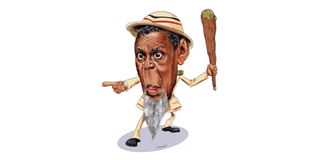Breaking News: At least 10 feared to have drowned in Makueni river
To Haji, real power must be seen, heard... and felt

What you need to know:
- In 1988, Haji had a motorist arrested and charged for refusing to give him a lift.
Last week, Haji was on the spot for blocking journalists from covering the Wednesday meeting between the Senate Defence and National Security Committee and Interior CS Fred Matiang’i.
Garissa Senator Yusuf Haji is probably a good man at heart; but, like many administrators from his era, he is also the kind used to holding power and wielding it.
Consider this: In 1988, Haji had a motorist arrested and charged for refusing to give him a lift, even though there is no law in Kenya requiring people to give lifts to government officials. The man, Peter Makau, had asked Haji, then a provincial commissioner, to “go and find a government vehicle”.
The PC was not amused and so had Makau charged and sentenced to three months in jail. The sentencing magistrate said Makau had “behaved in a very unsocial manner”.
“Government officials deserve respect,” said the magistrate. “The accused lacked respect… (and a) deterrent sentence should be meted out as a lesson to those with such unbecoming behaviour.”
Last week, Haji was on the spot for blocking journalists from covering the Wednesday meeting between the Senate Defence and National Security Committee and Interior CS Fred Matiang’i.
National outrage
Even though the issue caused national outrage and forced the Media Council of Kenya to call out the senator, the committee has always operated behind the curtains under Haji. To him, anything touching on national security is not for the cameras.
Some say that position violates parliamentary rules, others say Haji is right and just exercising caution. His detractors say he is a man stuck in a time warp of when he was a provincial commissioner, a rather powerful position in the Moi era.
But you have to give it to him. The legislator is among pioneer Africans who joined the colonial civil service long before independence, and since then has carved a rather illustrious career for himself.
He started in the colonial government as a district assistant and rose to the position of PC in the cut-throat Moi administration, which he served until 1998, when he retired.
He has also served as Cabinet minister in both the Moi and Kibaki regimes, besides serving as Nominated MP (1998-2002), Ijara MP (2007-2013) and Garissa Senator (2013 to date).
Great influence
All those joining the public service are bound by the Official Secrets Act, which stops civil servants from revealing government information that one accesses by virtue of their position. It appears that this oath of office had a great influence on Haji’s career, both as civil servant and a politician.
Despite the many complaints raised over the manner he handles the committee, Haji has never felt compelled to explain those perceptions of violations of the law.
Parliamentary Standing Orders provide circumstances under which the media can be excluded from committee meetings, but they do not expressly state that his committee is exempt.
Meanwhile, the astute man from Garissa keeps rolling up his sleeves, strapping his boots, and jumping into the trenches… muck, dirt and all.





